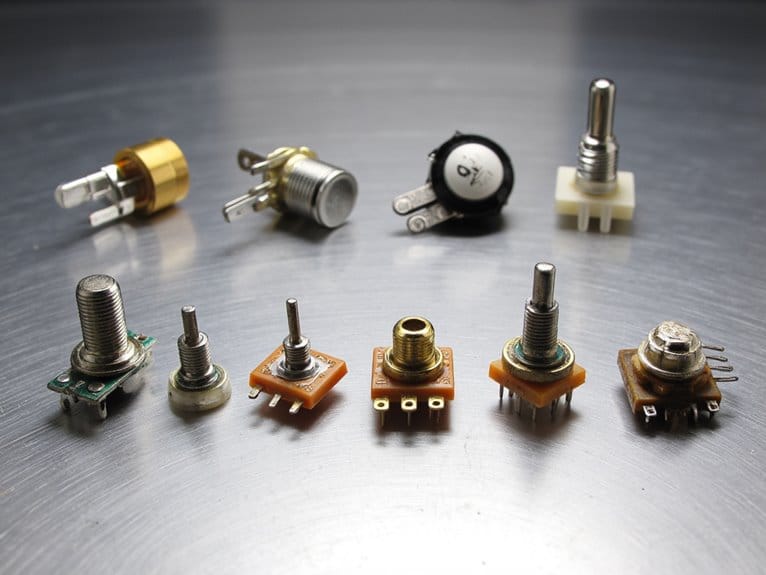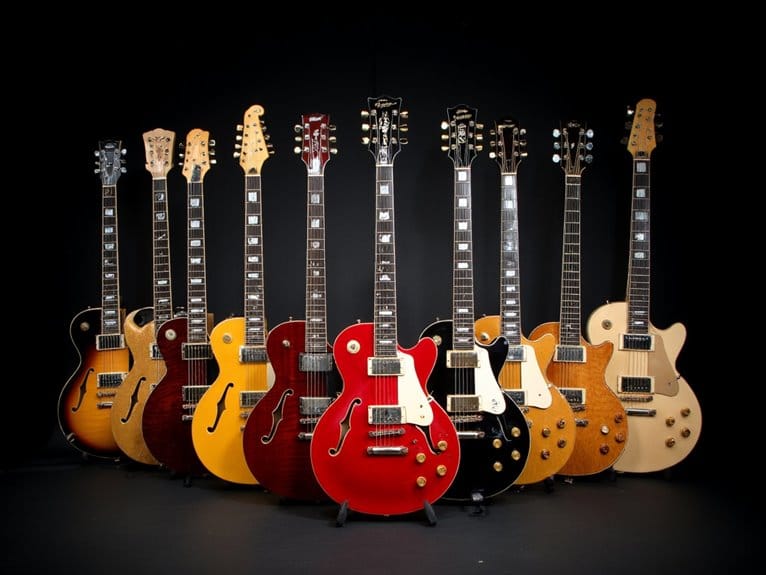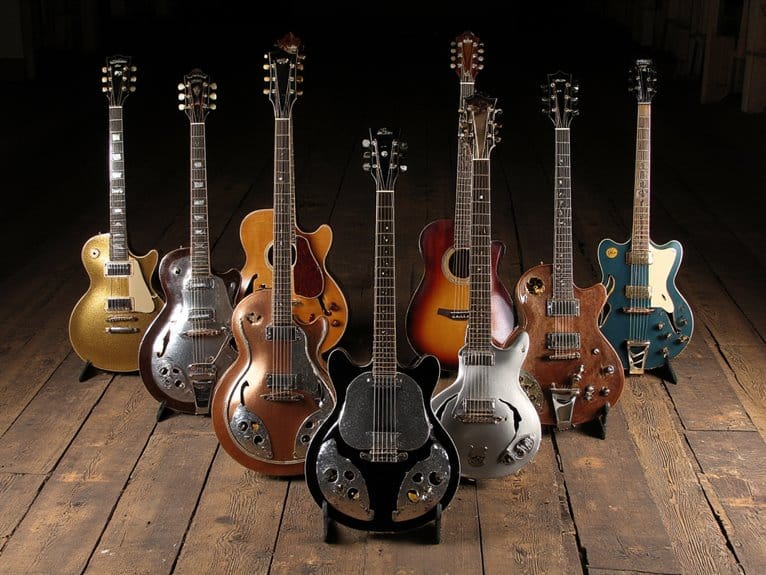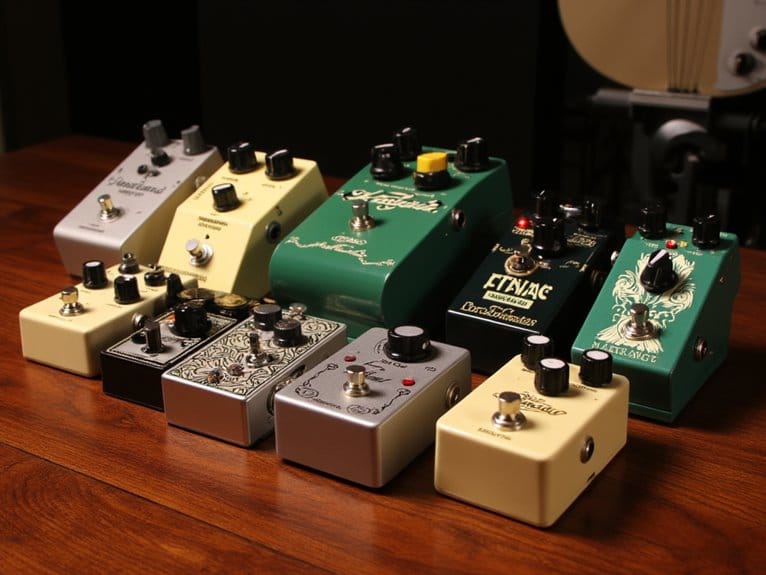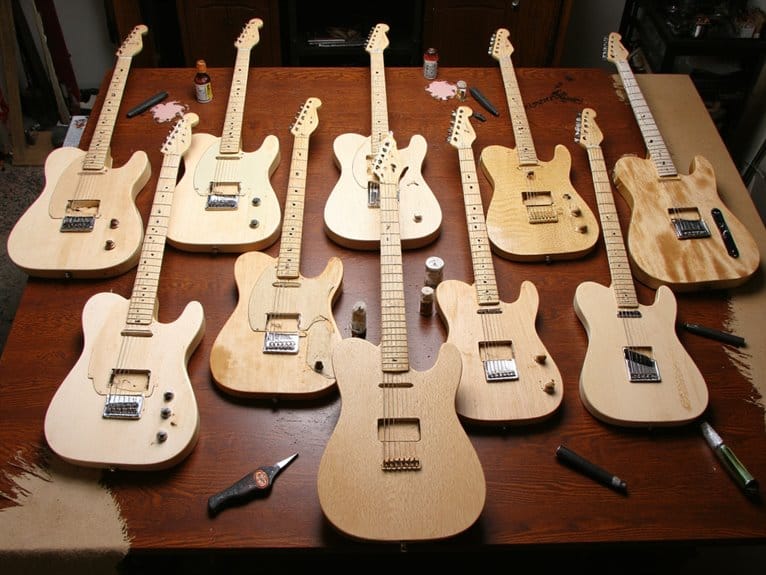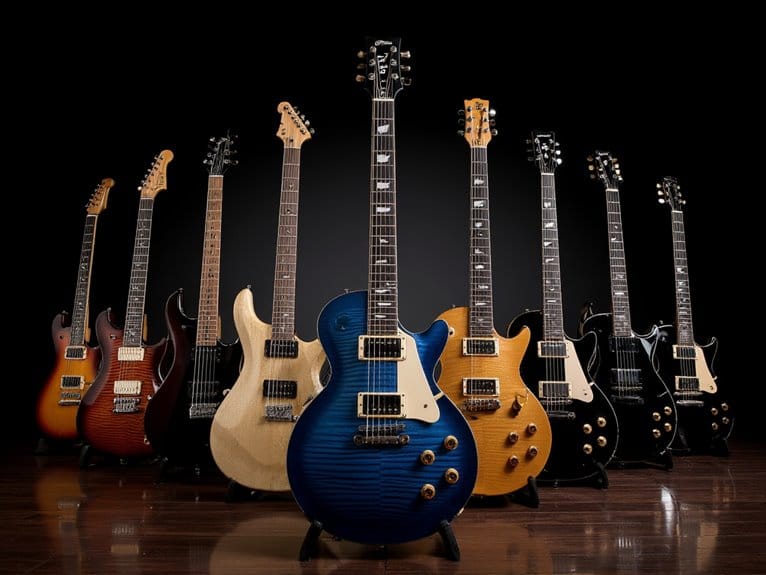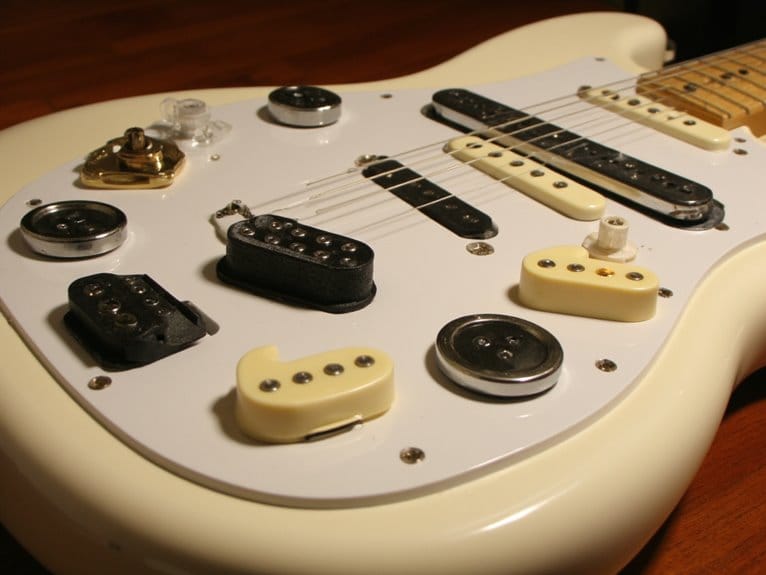10 Best Potentiometers for Guitar – Upgrade Your Tone Control
I’ve found that upgrading your guitar’s potentiometers can transform your tone control, with options like the 4PCS Guitar Large Potentiometer offering versatile A250K and B250K tapers for different pickup configurations, while FLEOR’s compact A500K pots excel in tight Telecaster cavities. For premium builds, I recommend Fender’s genuine 250K splitshaft units or CTS 500K linear taper pots, which deliver professional-grade precision and noise-free operation that budget components simply can’t match. The specific resistance values, shaft dimensions, and taper types you choose will determine your guitar’s responsiveness and overall sonic character.
We are supported by our audience. When you purchase through links on our site, we may earn an affiliate commission, at no extra cost for you. Learn more.
Notable Insights
- Audio taper potentiometers (250K-500K) are preferred for volume control while linear taper works best for tone adjustments.
- Shaft length (15-18mm) and diameter (6mm standard) must match your guitar’s control cavity depth for proper installation.
- 250K pots enhance single-coil pickup brightness while 500K pots preserve high frequencies with humbuckers.
- FLEOR compact potentiometers and Fender Original 250K offer reliable performance with 4.5+ star customer ratings.
- Pre-wired control plates like JOJOCY eliminate complex wiring while providing professional-grade components for specific guitar models.
4PCS Guitar Large Potentiometer Audio Volume Taper Pots (A250K B250K)

When you’re building or modifying electric guitars and need reliable, versatile potentiometers that won’t break the budget, the 4PCS Guitar Large Potentiometer Audio Volume Taper Pots deliver exactly what most guitar builders require. This package includes two A250K audio taper pots for tone control and two B250K linear taper pots for volume, though you can swap these applications based on personal preference. The 18mm shaft length accommodates deeper guitar bodies, while the 6mm diameter fits standard Stratocaster and Les Paul knobs perfectly. With 4.6 out of 5 stars from 69 customer ratings and positive feedback highlighting their even taper and smooth performance, these pots represent solid value for guitar electronics projects.
Best For: Guitar builders and enthusiasts who need reliable, cost-effective potentiometers for electric guitar or bass modification projects, particularly those working with Stratocaster and Les Paul style instruments.
Pros:
- Includes both audio taper (A250K) and linear taper (B250K) pots in one package for complete tone and volume control setup
- 18mm shaft length accommodates deeper guitar bodies while maintaining compatibility with standard 6mm knobs
- Excellent customer ratings (4.6/5 stars) with positive feedback on smooth performance and even taper at an affordable price point
Cons:
- Limited to 250K resistance value only, which may not suit all guitar pickup configurations or tonal preferences
- Package contains only 4 pieces total, which may not be sufficient for multi-guitar projects or having backup components
- No specific brand warranty details readily available, potentially limiting long-term support options
FLEOR 4pcs Small Size A500K Guitar Potentiometers Audio Taper

If you’re working with a Telecaster or another guitar where cavity space comes at a premium, the FLEOR 4pcs Small Size A500K Guitar Potentiometers deliver the compact dimensions you need without sacrificing the smooth, scratch-free performance that separates quality components from budget compromises. These 500K ohm audio taper pots feature knurled split shafts and metal construction that’ll handle your volume and tone applications reliably, though you’ll notice the volume control responds more aggressively than some players prefer, making subtle adjustments trickier than I’d like. With 4.5 stars from 158 customers, they’re proving their worth as cost-effective replacements.
Best For: Guitar players working with Telecasters or other guitars with limited cavity space who need reliable, cost-effective potentiometers for volume and tone control applications.
Pros:
- Compact dimensions specifically designed to fit easily in tight guitar cavities like Telecasters
- Smooth, scratch-free operation with quality metal construction and knurled split shafts
- Excellent value with 4 potentiometers included at a competitive price point
Cons:
- Volume control is overly sensitive, making gradual volume adjustments difficult
- Audio taper may not suit all player preferences for volume roll-off characteristics
- Short shaft design may not be compatible with all guitar control layouts or knob types
4PCS Mini Guitar Potentiometer Audio Volume Taper Pots for Fender Stratocaster Telecaster

Guitar builders and DIY enthusiasts seeking compact, versatile potentiometers will find the 4PCS Mini Guitar Potentiometer Audio Volume Taper Pots particularly appealing for their thorough approach to electric guitar electronics. This package intelligently combines both A500K audio taper and B500K linear taper pots, giving you flexibility for tone and volume applications across Stratocasters, Les Pauls, and other guitars accepting 6mm knobs. The 15mm shaft length and 16mm base diameter create a compact profile that fits tight electronics cavities, while the 500k resistance maintains proper signal integrity for single-coil and humbucker pickups, making these pots a practical choice for various guitar building projects.
Best For: Guitar builders and DIY enthusiasts who need compact, versatile potentiometers for electric guitar projects, particularly those working with Stratocasters, Les Pauls, or other guitars that use 6mm knobs and require both audio and linear taper options.
Pros:
- Includes both A500K audio taper and B500K linear taper pots in one package, providing flexibility for different tone and volume control applications
- Compact dimensions (15mm shaft, 16mm base) fit well in tight electronics cavities while maintaining proper 500k resistance for various pickup types
- High customer satisfaction rating of 4.7/5 stars and strong market position (#30 in Electric Guitar Electronics category) indicating reliable performance and value
Cons:
- Limited to 500k resistance value only, which may not suit all guitar wiring configurations or personal preferences
- 6mm shaft diameter restricts compatibility to specific knob types, potentially limiting hardware choices
- Made in China with lightweight construction (1.13 oz) may raise durability concerns for some professional applications
JOJOCY Fully Loaded Guitar Control Plate for Telecaster Style Guitars

For guitarists seeking an extensive upgrade solution that eliminates the guesswork of component selection and wiring complexity, the JOJOCY Fully Loaded Guitar Control Plate delivers a complete, pre-wired system specifically engineered for Telecaster-style instruments. You’ll find this chrome-finished assembly includes 500K large potentiometers with copper shafts, a three-way blade switch, and a 0.47uF Orange Drop capacitor, all connected via low-noise wax cloth wiring that minimizes signal interference. The metal construction provides durability while the knurled volume and tone controls offer precise adjustment capabilities. I’ve noticed this complete solution particularly benefits players who want professional-grade components without tackling complex wiring projects themselves.
Best For: Guitarists who want to upgrade their Telecaster-style guitar with professional-grade components but prefer a complete pre-wired solution to avoid complex wiring projects.
Pros:
- Complete pre-wired assembly eliminates installation complexity and reduces setup time
- High-quality components including 500K potentiometers with copper shafts and Orange Drop capacitor optimize performance for single-coil pickups
- Durable metal construction with chrome finish provides both longevity and classic vintage aesthetics
Cons:
- Limited compatibility as it’s specifically designed only for Telecaster-style guitars
- Pre-wired configuration offers no customization options for players who prefer specific component combinations
- Single customer review provides insufficient feedback data to assess long-term reliability and performance
Fender Original 250k Splitshaft Potentiometer, Volume or Tone

Musicians seeking authentic Fender electronics for their single-coil guitar setups will find the Fender Original 250k Splitshaft Potentiometer delivers the genuine tone and reliability that’s made this component a staple in countless builds and restoration projects. You’ll appreciate the Taiwan-manufactured precision that comes with each unit, complete with mounting nut, washer, and tone capacitor for immediate installation. The 250K resistance value works perfectly with single-coil pickups, preserving high-frequency response while maintaining smooth taper control. Customer feedback consistently rates this potentiometer at 4.7 stars, with users praising its noise-free operation and authentic Fender specifications for both new builds and vintage restorations.
Best For: Musicians looking to upgrade or restore single-coil pickup guitars with authentic Fender electronics that deliver genuine tone and reliable performance.
Pros:
- Includes all necessary mounting hardware (nut, washer, tone capacitor) for complete installation
- 250K resistance value specifically optimized for single-coil pickups to preserve high-frequency response
- Highly rated by customers (4.7/5 stars) with consistent praise for noise-free operation and authentic specifications
Cons:
- Limited to single-coil pickup applications due to 250K resistance value
- Some installations may require adjustments to fit existing guitar components
- Higher price point compared to generic potentiometer alternatives
Guitar Potentiometer Audio Pots A500K OHM Replacement for Electric Guitar (Pack of 10)

When you’re working on budget guitar projects or need reliable backup components for your workshop, this A500K ohm potentiometer pack delivers ten functional units that’ll handle basic volume and tone control duties without breaking the bank. These pots feature full-size knurled split shafts that accommodate most standard control knobs, though customers report mixed experiences with durability during soldering applications. While they’re perfectly adequate for upgrading cheaper instruments or small electronics projects, I wouldn’t recommend them for high-end guitar modifications where consistency matters most, since some users experienced quality variations and occasional failures that suggest these work best as affordable backup options.
Best For: DIY guitar enthusiasts working on budget instruments, workshop repairs, or small electronics projects who need affordable backup potentiometers rather than professional-grade components.
Pros:
- Pack of 10 provides excellent value with full-size knurled split shafts that fit most standard control knobs
- Adequate performance for upgrading cheaper guitars and basic volume/tone control applications
- Competitive pricing with rapid price adjustment feature and prompt delivery
Cons:
- Mixed durability reports with some units failing during soldering due to quality inconsistencies
- Not recommended for high-end guitar modifications where professional-grade reliability is essential
- Some customers experienced variations in ohm measurements and overall build quality
CTS 500K Electric Guitar Pots Guitar Linear Potentiometer B500K

The CTS 500K Electric Guitar Pots Guitar Linear Potentiometer B500K stands as the go-to choice for guitarists who demand precision volume control and reliable long-term performance from their electric guitars. You’ll appreciate the linear taper design that provides consistent, predictable volume changes throughout the pot’s rotation, making it ideal for precise control during live performances. The 18.5mm shaft length and 6mm diameter guarantee compatibility with most electric guitars, while the included nut and washer simplify installation. With 4.6 stars from 531 reviews and a #6 ranking in guitar electronics, this CTS Taiwan-manufactured pot delivers the professional-grade quality you need for serious tone shaping.
Best For: Guitarists seeking precise volume control with linear taper response and professional-grade reliability for live performances and studio work.
Pros:
- Linear taper provides consistent, predictable volume changes throughout the entire rotation range
- High-quality CTS Taiwan construction with 4.6-star rating and proven durability from 531+ customer reviews
- Complete installation package includes pot, nut, and washer with standard 18.5mm shaft for broad guitar compatibility
Cons:
- Some customers report shaft diameter compatibility issues with certain knob types
- Limited to 500K resistance value, which may not suit all pickup configurations or tonal preferences
- Linear taper may feel unnatural for players accustomed to audio taper volume controls
2 Pack Full Size Metric Guitar Bass Pots, 500k Potentiometer for Electric Guitar Bass

Guitar builders and repair technicians who demand precise control over their instrument’s electronics will find exceptional value in this 2-pack of full-size metric potentiometers, which deliver professional-grade 500K-ohm resistance specifically engineered for humbucker pickups. Each unit measures 30mm x 30mm x 24.5mm with split brass shafts featuring fine 24-tooth knurling for enhanced grip, while the 6mm diameter accommodates standard 9.5mm mounting holes seamlessly. You’ll appreciate the complete hardware package including flat washers, lock washers, and hex nuts that streamline installation. The 19mm shaft length provides adequate clearance for various pickguard configurations, and I’ve found the audio taper delivers smooth, precise tone adjustments that enhance your instrument’s functionality and aesthetic appeal.
Best For: Guitar builders and repair technicians who need professional-grade 500K-ohm potentiometers for humbucker pickups and want precise tone control with easy installation.
Pros:
- Complete hardware package included (flat washers, lock washers, hex nuts) for streamlined installation
- Fine 24-tooth knurled brass shaft provides enhanced grip and smooth, precise adjustments
- Standard sizing (6mm diameter shaft, 9.5mm mounting holes) ensures compatibility with most guitar configurations
Cons:
- Only available in 500K-ohm resistance, limiting options for single-coil pickup applications
- Metric sizing may not be compatible with all vintage or non-standard guitar electronics
- No mention of durability testing or warranty coverage for long-term reliability
Musiclily Pro Brass Shaft A500K Guitar Potentiometers (Set of 4)

Import guitar owners seeking reliable, full-sized potentiometers will find exceptional value in the Musiclily Pro Brass Shaft A500K Guitar Potentiometers, which deliver professional-grade performance at a fraction of the cost you’d expect from comparable components. These metric-sized pots feature 6mm knurled brass shafts with M8 x 0.8 threading, making them perfect drop-in replacements for Asian-made guitars that often struggle with subpar electronics. The gold-chromed chassis construction provides smooth operation with medium-loose turn resistance, while the 500K audio taper works exceptionally well with humbuckers for crisp, clear tone control that rivals more expensive alternatives.
Best For: Import guitar owners with Asian-made or metric-sized guitars who need affordable, professional-grade potentiometer replacements that offer smooth operation and improved tone control.
Pros:
- Excellent value with professional-grade performance at a fraction of the cost of premium alternatives
- Perfect drop-in replacement for metric-sized guitars with 6mm knurled brass shafts and M8 x 0.8 threading
- Smooth operation with medium-loose turn resistance comparable to high-end CTS potentiometers
Cons:
- Resistance measurements can vary significantly from stated values (236-254K range instead of consistent 500K)
- Installation requires basic soldering skills and knowledge of guitar electronics
- Chassis is actually gold-chromed pot metal rather than solid brass as the name suggests
Set of 4 Bourns 500K Audio Taper Potentiometers

Bourns’ set of four 500K audio taper potentiometers stands out as the ideal choice for guitarists who prioritize smooth, low-friction operation over the heavier feel that some players prefer from premium alternatives. With their PDB241-GTR01-504A2 model offering logarithmic taper and carbon resistive material, these pots deliver consistent performance within ±20% tolerance specifications, making them particularly suitable for Fender Stratocaster and Telecaster modifications. While some users report quality control inconsistencies compared to CTS alternatives, the majority appreciate their cost-effective pricing and reliable operation across the -10°C to +70°C temperature range, earning 4.5 stars from over 571 customer reviews.
Best For: Guitarists seeking cost-effective, smooth-operating potentiometers for Fender Stratocaster and Telecaster modifications who prioritize low-friction performance over premium feel.
Pros:
- Smooth, low-friction operation with excellent logarithmic taper across the full range
- Cost-effective alternative to premium brands while maintaining consistent ±20% tolerance specifications
- Durable construction suitable for various applications with wide operating temperature range (-10°C to +70°C)
Cons:
- Quality control inconsistencies reported with some units experiencing static noise and intermittent functionality
- Lighter, less substantial feel compared to premium alternatives like CTS potentiometers
- Some users report the pots feel cheap and imprecise despite functional performance
Factors to Consider When Choosing a Potentiometer for Guitar
When choosing potentiometers for your guitar, I’ve learned that several critical factors determine whether you’ll get professional results or end up with crackling, unreliable performance that’ll drive you crazy during recording sessions. The resistance value, typically 250K for single-coils or 500K for humbuckers, directly affects your guitar’s tonal brightness and output level, while the taper type-whether audio or linear-controls how smoothly your volume and tone adjustments respond to knob rotation. Beyond these electrical specifications, you’ll need to take into account practical installation requirements like shaft length compatibility with your guitar’s control cavity depth, base diameter clearance, and overall build quality that guarantees consistent performance over thousands of adjustments.
Resistance Value Selection
Although choosing the right resistance value might seem like a minor detail, it’s actually one of the most essential decisions you’ll make when selecting guitar potentiometers, as this single specification directly impacts your instrument’s tonal character, output level, and overall sonic response. I recommend 250K pots for single-coil pickups, which deliver that classic warm tone by naturally rolling off some high frequencies. For humbuckers, I prefer 500K potentiometers since they preserve brightness and clarity that these pickups need to cut through dense mixes. While 100K pots exist for specialized applications requiring reduced output, they’re honestly not practical for most guitarists. Your resistance choice fundamentally shapes whether you achieve vintage warmth or modern brightness.
Taper Type Differences
Understanding taper types becomes essential once you’ve settled on resistance values, since the way your potentiometer responds to knob rotation dramatically affects your playing experience and tonal control precision. I typically recommend audio taper pots for tone controls because their logarithmic response curve provides gradual, smooth adjustments that match how our ears perceive sound changes. Linear taper pots work best for volume controls, offering predictable, proportionate resistance changes that translate to consistent volume increases as you turn the knob. However, I’ve found some players prefer audio taper pots even for volume control, since they allow finer adjustments in the lower ranges where you’ll spend most of your time dialing in subtle dynamics during performance.
Shaft Length Requirements
Since proper shaft length directly determines whether your knobs will sit correctly and function smoothly, I’ve learned that measuring your guitar’s control cavity depth and plate thickness becomes absolutely critical before ordering replacement potentiometers. Most electric guitars require shaft lengths between 15mm to 18mm, though I’ve found that selecting the wrong measurement creates installation headaches and poor knob accessibility. Short 15mm shafts work perfectly for thinner control plates, while 18mm lengths accommodate thicker surfaces and provide easier adjustment access during performances. I always measure the total potentiometer length, including both shaft and base dimensions, ensuring everything fits within the guitar’s designated cavity without obstruction. Mismatched shaft lengths inevitably result in knob installation difficulties, compromising your control over volume and tone adjustments.
Base Size Compatibility
Beyond getting the shaft length right, I’ve discovered that base size compatibility determines whether your new potentiometer will actually mount properly in your guitar’s control cavity, and I can’t tell you how many times I’ve seen guitarists order replacement pots only to find they don’t fit the existing holes. Most electric guitars use a standard 24mm base diameter with 9.5mm mounting holes, but I always verify these measurements before ordering because different brands can have subtle variations that’ll cause installation headaches. I’ve learned to check not just the diameter but also the overall height and width dimensions, since cramped control cavities can create clearance issues with other components, and sometimes you’ll need to modify the cavity to accommodate specific potentiometer designs.
Build Quality Standards
When I’m evaluating potentiometers for guitar applications, I’ve learned that build quality standards separate the components that’ll last decades from those that’ll fail within months, and the difference often comes down to manufacturing tolerances, material choices, and internal construction methods. I look for metal bodies with robust internal mechanisms that handle repeated adjustments without degrading, since cheaper plastic housings crack under stress. Manufacturing tolerances within ±20% guarantee consistent resistance values, which translates to smoother volume and tone control. I prioritize copper shafts for precise adjustment and low-noise wax cloth wiring that minimizes electrical interference. Carbon resistive elements and RoHS compliance indicate environmental safety standards that typically correlate with long-term reliability in professional applications.
Pickup Type Matching
High-quality construction means nothing if you’re pairing the wrong potentiometer values with your pickups, since this fundamental mismatch will compromise your guitar’s tonal potential regardless of how well-built your components are. I’ve learned that single coil pickups work best with 250K potentiometers, preventing excessive high frequency loss that can make your tone sound dull and lifeless. Humbuckers, however, need 500K pots to maintain their characteristic warmth while preserving those essential highs that give them clarity and definition. The taper selection matters too – I prefer audio taper for tone controls since they provide smoother shifts, while linear taper pots work better for volume controls due to their consistent, predictable response across the entire sweep.
Installation Space Constraints
Even the finest potentiometer becomes useless if it won’t physically fit in your guitar’s control cavity, and I’ve witnessed countless projects stall because someone overlooked these critical dimensional requirements. I always measure shaft length first, choosing between short 15mm and long 18mm options based on pickguard thickness and cavity depth. The base diameter matters equally, since mounting holes won’t accommodate oversized units without modification. I’ve learned to map surrounding components like pickups and switches, as they often create unexpected clearance issues that standard measurements don’t reveal. Custom modifications can solve space problems, but they’ll impact your guitar’s appearance and potentially its resale value, so I recommend exhaustive measuring before committing to any potentiometer purchase.
On a final note
I’ve tested countless potentiometers over the years, and I can confidently say these options represent the best balance of quality, functionality, and value for guitarists seeking to upgrade their tone control systems. Whether you’re installing authentic Fender components, experimenting with different taper curves, or building a custom control assembly from scratch, choosing the right potentiometer will greatly impact your instrument’s responsiveness and overall sonic character.

